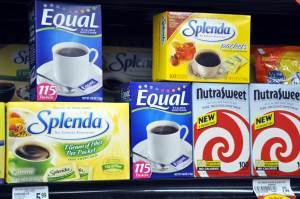Aspartame, NutraSweet, Equal, Spoonful ...
 When I agreed to write on this topic, I did so because I have always had some strong personal feelings against anything artificial in our diets.
When I agreed to write on this topic, I did so because I have always had some strong personal feelings against anything artificial in our diets.
In the ideal world, we would eat everything organic, like it was less than 100 years ago.
However, in this less than ideal world, at least from a nutritional view point, we find food processors, manufacturers and purveyors determined to impress their investors with great "bottom line" profits through whatever means our free enterprise system allows.
Unfortunately, nutritional consideration are not first in the priority lists of most Fortune 500 companies involved in the manufacture, distribution and sale of food products. I would contend that appeal to taste (without regard for nutrition) which leads to consumption, is first.
Little did I realize that upon researching Aspartame that I would step into a virtual hornets nest. There are over 6,000 web pages, according to Aspartame Truth Information web site, devoted to discussing, revealing, berating and defending this non-nutritive item which has infiltrated a huge segment of the food market.
The desire to reduce the calorie content of our meals, in order to manage weight, and the wish by those on sugar restricted diets (primarily Diabetics) to enjoy the taste of sweet, are the two driving forces in this market.
I used the phrase "non-nutritive" because artificial sweeteners provide no nutrition to our diets nor is the taste of sweet a fundamental necessity for optimal health. All tastes are acquired and for those with a "sweet tooth" will find that if they increase the protein consumption in their diets, the "sweet tooth" will become much less powerful.
Aspartame is the artificial combining of two naturally occurring amino acids - phenylalanine and Aspartic acid. Questioning the efficacy and safety of this product is the subject of the majority of the 6,000 web sites.
This short article could never explain nor provide you with adequate information to intelligently draw valid conclusion about the safety and efficacy of the product. So I will tease you with a few points from both sides of the controversy and leave you with some references for further exploration.
One of the reasons for using aspartame is the quest to reduce calories and therefore lose or maintain body weight. However, there is some evidence, disputed by the manufacturers of course, that the sweet sensation provided by artificial sweeteners, including aspartame, can through a "neural/humoral" connection cause the pancreas to secrete insulin regardless of the blood sugar levels.
Insulin is the storage hormone and inhibits fat mobilization, thus defeating the original goal to lose fat. With elevated insulin which does not combine with blood sugars, you get an increase in appetite and a craving for carbohydrates. This has been reported by several researchers and of course denied by the research of the manufacturing companies.
The other major criticism is that the Phenylalanine component degrades into methanol which quickly converts into formaldehyde and accumulates in cells. Accumulated formaldehyde can become toxic to nerve cells over time.
The industry claims that the methanol levels in question are well within safe limits and recognized by the FDA in the US and the Health Protection Branch in Canada.
The literature reports a myriad of health problems ranging from behavioral and neurological disorders to immune system breakdowns leading to cancer, arthritis, MS, Parkinson's Disease, ALS and Alzheimer's disease. Others report headaches, epileptic seizures, allergies and mood swings. All such allegations are denied by the industry as they report their research.
Independent research finds problems with aspartame research. An analysis of 164 peer reviewed medical studies by Dr. Ralph Walton of Northeastern Ohio University found that of the 90 non-industry sponsored (independent) studies, 83 (92%) identified one or more problems with aspartame.
Of the 74 aspartame industry sponsored studies all (100%) claimed that no problems were found with aspartame. Little comfort for the consumer.
For further research check out the following:
Pro aspartame
www.aspartamefacts.com and www.aspartame-info.com (webmaster's note - first link doesn't work)
Against aspartame
www.holisticmed.net/aspartame/adverse.txt or e-mail Dr. Mark Gold or e-mail Mary Stoddard
Apparently neutral
www.aspartametruth.com (link is dead)
Author
Dr. L. Lee Coyne, the Healthy Professor
 Dr. Coyne is a former Professor of exercise physiology and nutrition and the nutrition coach to many high performance athletes including several Canadian Olympic teams. (Tanya Dubnicoff, Olympic cyclist, Michelle Morton, Olympic speed skater, several Olympic Biathletes, skiers and hockey players, Jamie Clarke, Everest Summiteers) and successful "Empty Quarter" desert expedition leader.
Dr. Coyne is a former Professor of exercise physiology and nutrition and the nutrition coach to many high performance athletes including several Canadian Olympic teams. (Tanya Dubnicoff, Olympic cyclist, Michelle Morton, Olympic speed skater, several Olympic Biathletes, skiers and hockey players, Jamie Clarke, Everest Summiteers) and successful "Empty Quarter" desert expedition leader.
His writing appears regularly in the Fit Start insert of the Calgary Sun and a bi-monthly health and fitness magazine “Impact”.
His books include “Fat Won’t Make You Fat”, “The Sports Nutrition Coaches Handbook” & “Nutritional Symptomatology, the consumers handbook”. His most recent release is “The Little Book of Nutrition Nuggets”.
You may contact Lee through Fish Creek Publishing at 1-800-668-4042 or by e-mail dr.coyne@leanseekers.com or visit Dr. Coyne's website to purchase books and coaching online:
"Dr. L. Lee Coyne, the Healthy Professor"